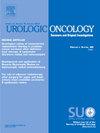晚期/转移性肾细胞癌随机对照试验的易损性指数。
IF 2.4
3区 医学
Q3 ONCOLOGY
Urologic Oncology-seminars and Original Investigations
Pub Date : 2025-05-01
DOI:10.1016/j.urolonc.2025.03.003
引用次数: 0
摘要
目的:采用脆弱性指数(FI)作为非综合p值的补充来评估随机对照试验(RCTs)的稳健性。本研究的目的是评估使用FI的晚期/转移性肾细胞癌(a/mRCC)随机对照试验的统计稳健性。材料和方法:从PubMed数据库中检索2000年1月1日至2023年12月31日期间发表在4种最具影响力的普通医学期刊和25种最具影响力的泌尿学期刊上的与a/mRCC相关的随机对照试验。FI采用Fisher精确检验计算。进行Spearman相关分析以评估与FI相关的潜在因素。结果:筛选了16项符合条件的rct,中位总样本量为654.5 (IQR, 461-847),中位失访患者为14 (IQR, 3-23)。中位FI为12.5 (IQR, 8.5-27),表明仅13例患者的结果改变可能会逆转试验的意义。在7项(44%)随机对照试验中,失去随访的患者数量超过或等于FI。p值与FI呈负相关,而失访患者数和入组患者数无统计学意义。结论:并非所有与a/mRCC相关的随机对照试验都像之前认为的那样具有统计稳健性,因此应仔细解释。我们建议在泌尿科随机对照试验中额外报告FI,作为p值的补充,以帮助读者通过考虑结果的脆弱性得出可靠的结论。本文章由计算机程序翻译,如有差异,请以英文原文为准。
The fragility index of randomized controlled trials in advanced/metastatic renal cell cancer
Purpose
The fragility index (FI) has been applied as a supplement to the noncomprehensive P-values to assess the robustness of randomized controlled trials (RCTs). The objective of this study is to evaluate the statistical robustness of RCTs of advanced/metastatic renal cell cancer (a/mRCC) using the FI.
Materials and methods
RCTs related to a/mRCC published in the 4 highest-impact general medical journals and the 25 highest-impact urological journals between January 1, 2000, and December 31, 2023, were identified from PubMed database. The FI was calculated by using Fisher's exact test. Spearman's correlation analysis was conducted to assess potential correlates regarding FI.
Results
16 eligible RCTs were screened with a median total sample size of 654.5 (IQR, 461–847) and a median patients lost to follow-up of 14 (IQR, 3–23). The median FI was 12.5 (IQR, 8.5–27), suggesting that a switch in outcomes in only 13 patients would have reversed the significance of the trials. The number of patients lost to follow-up exceeded or equaled to the FI in 7 (44%) RCTs. P-values were negatively associated with the FI, while the number of patients lost to follow-up and patients enrolled were not statistically significant.
Conclusion
Not all RCTs associated with a/mRCC are as statistically robust as previously considered and should therefore be construed carefully. We suggest that additional reporting of FI in urological RCTs as a supplement to the P-value to assist readers in concluding reliably by considering the fragility of the outcomes.
求助全文
通过发布文献求助,成功后即可免费获取论文全文。
去求助
来源期刊
CiteScore
4.80
自引率
3.70%
发文量
297
审稿时长
7.6 weeks
期刊介绍:
Urologic Oncology: Seminars and Original Investigations is the official journal of the Society of Urologic Oncology. The journal publishes practical, timely, and relevant clinical and basic science research articles which address any aspect of urologic oncology. Each issue comprises original research, news and topics, survey articles providing short commentaries on other important articles in the urologic oncology literature, and reviews including an in-depth Seminar examining a specific clinical dilemma. The journal periodically publishes supplement issues devoted to areas of current interest to the urologic oncology community. Articles published are of interest to researchers and the clinicians involved in the practice of urologic oncology including urologists, oncologists, and radiologists.

 求助内容:
求助内容: 应助结果提醒方式:
应助结果提醒方式:


